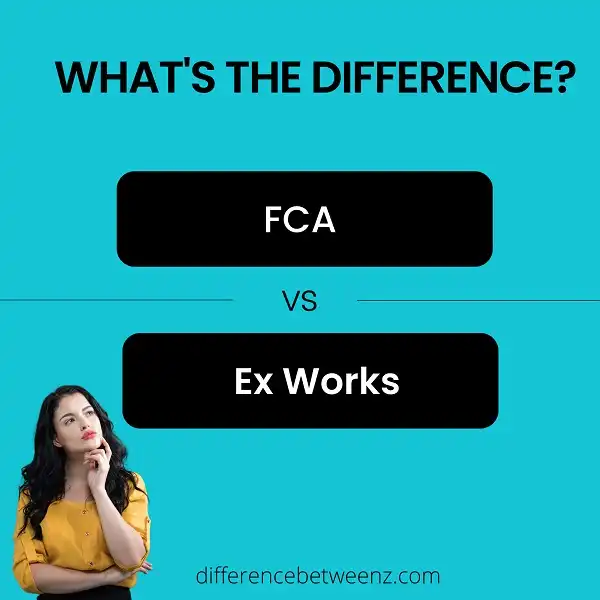There are two predominant commercial terms in the international trade industry: FCA and Ex Works. FCIA is essentially an abbreviation for “free carrier, Inland”. It is an Incoterms 2010 freight term that defines the point at which risk and responsibility for the goods passes from the seller to the buyer.
Ex works (EXW) is a type of Incoterm that indicates who pays for transport, when export duties are payable, and how title to the goods passes. EXW also determines who is responsible for loading and unloading the cargo. This article will go over these key points so you can better understand which term works best for your needs.
What is FCA?
FCA (Free Carrier) is an Incoterm that can be used for any mode of transport, including multimodal shipments. FCA means that the seller hands over the goods to the carrier nominated by the buyer at the seller’s premises, or at a named place nearby. The risks and costs associated with the shipment are then transferred from the seller to the buyer once the goods are handed over to the carrier. FCA is often used when the buyer wants to have control over how their goods are shipped, or when the seller does not have their own shipping capabilities. FCA is a popular choice for international shipments as it offers flexibility and protects both buyers and sellers from unexpected costs or delays.
What is Ex Works?
Ex Works is a commercial term that indicates that the seller of goods is responsible for making the goods available at their premises. The buyer is then responsible for collecting the goods and paying for transport costs. Ex Works is sometimes abbreviated to ExW or XW. Ex Works is one of the least expensive ways to ship goods as the seller is only responsible for making the goods available. The buyer is responsible for all other costs, including transport, import duties, and insurance.
Ex Works is often used when the buyer has a good working relationship with the seller and can arrange collection and transport quickly and efficiently. Ex Works is not suitable for buyers who are unfamiliar with the country’s import procedures or who do not have their own transport arrangements in place. Ex Works is also not suitable if the buyer wants the seller to be responsible for the condition of the goods when they arrive at their destination. The Ex Works term should always be specified in a sales contract to avoid any misunderstanding.
Difference between FCA and Ex Works
FCA and Ex Works are two very different terms that are used in international shipping. FCA stands for Free Carrier, which means that the seller is responsible for delivering the goods to the carrier at the port of loading. Ex Works, on the other hand, means that the buyer is responsible for taking delivery of the goods at the seller’s premises.
FCA is therefore a much more advantageous terms for the seller, as it gives them greater control over the delivery of the goods. Ex Works is generally used when the buyer has their own transport arrangements in place, or when the seller is unable to arrange transport themselves. It is important to carefully consider which term is more appropriate for your particular shipment, as this can have a significant impact on who is responsible for what costs.
Conclusion
FCA and Ex Works are two very different terms that are used in international shipping. FCA stands for Free Carrier, which means that the seller is responsible for delivering the goods to the carrier at the port of loading. Ex Works, on the other hand, means that the buyer is responsible for taking delivery of the goods at the seller’s premises.
FCA is therefore a much more advantageous terms for the seller, as it gives them greater control over the delivery of the goods. Ex Works is generally used when the buyer has their own transport arrangements in place, or when the seller is unable to arrange transport themselves. It is important to carefully consider which term is more appropriate for your particular shipment, as this can have a significant impact on who is responsible for what costs.


